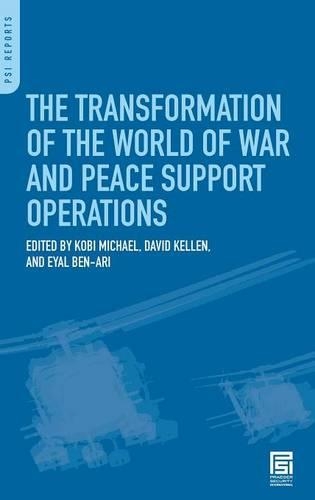
The Transformation of the World of War and Peace Support Operations
(Hardback)
Publishing Details
The Transformation of the World of War and Peace Support Operations
By (Author) Kobi Michael
By (author) David Kellen
By (author) Eyal Ben-Ari
Bloomsbury Publishing PLC
Praeger Publishers Inc
20th March 2009
United States
Classifications
Tertiary Education
Non Fiction
341.584
Physical Properties
Hardback
232
Width 156mm, Height 235mm
907g
Description
With the end of the Cold War, the euphoria of the Gulf War of the 1990s and the avowal of a New World Order, peace-operations were declared as the recipe for a better world through international intervention in conflict arenas. However, the debacles and failures in Cambodia, Somalia, or the Balkans led to disillusionment and a sense of strategic helplessness among leaders, experts and scholars in the industrial democracies. While these arguments have been the focus of intense criticism and discussion, they nevertheless underscore the fact that since the end of the Cold War the armed forces of the industrial democracies have undergone very significant transformations. This is the first work linking the changes in armed forces to Peace Support Operations (PSOs), those operations with major state-building components that demand broad and coherent cooperation between military forces and civilian entities. The Transformation of the World of War and Peace Support Operations is timely as the recent debates over PSOs continue to take center stage. This work embodies a new set of ideas and concepts that aid in grasping and interpreting the transformations taking place in the world of war and in PSOs. It seeks to understand how social, economic, political, and organizational transformations around the globe are related to the complex links between armed forces and PSOs. Additionally, this work addresses issues that continue to define the character and makeup of modern warfare and the missions of PSOs for coming decades.
Author Bio
Dr. Kobi Michael is an assistant professor at Ben-Gurion University of the Negev and senior research fellow at the Jerusalem Institute for Israel Studies. He has previously served as a senior advisor at the Israeli National Security Council and in addition to his position at Ben-Gurion University he lectures at Tel-Aviv University, the Interdisciplinary Center in Herzliya, and the Israeli National Defense College. Dr. Michael is a recipient of the Tshetshik Prize (2005) and the Yariv Award (2002). His most recent book is Between Militarism and Statesmanship in Israel. Dr. Michael has edited five books about peacekeeping operations and the Israeli-Palestinian conflict and has published more than 30 articles and monographs about civil-military relations, peacekeeping operations, security cooperation and Jerusalem's future political status. David Kellen is the Israeli Coordinator of the Strategic Affairs Unit at the Israel-Palestine Center for Research and Information. David holds an MA in Conflict Analysis from the Hebrew University of Jerusalem. Together with Kobi Michael, he has published several articles on peacekeeping in the Israeli-Palestinian context and has co-edited Stabilizing the Israeli-Palestinian Conflict: Considerations for a Multinational Peace Support Operation (2007). Eyal Ben-Ari is Professor in the Department of Sociology and Anthropology at the Hebrew University of Jerusalem. He has carried out research in Japan, Israel, and Singapore on white collar communities, early childhood education, business expatriates, the Israeli and Japanese militaries and peacekeeping forces. His previous publications include Body Projects in Japanese Childcare (1997), Mastering Soldiers (1998), Rethinking the Sociology of Combat: Israel's Combat Units in the Al-Aqsa Intifada (with Zev Lehrer, Uzi Ben Shalom-, and Ariel Vainer) (2008). Among his recent edited books are The Military and Militarism in Israeli Society (with Edna Lomsky-Feder) (2000), War, Politics and Society in Israel (with Daniel Maman and Zeev Rosenhek) (2001), and Echoes of Partition (with Smita Jassal) 2006).
